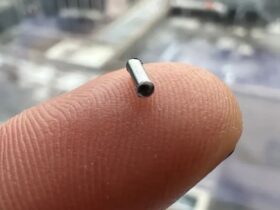In a significant groundbreaking medical development, researchers have created a tiny device, smaller than a grain of rice, to deliver drugs directly to the pancreatic tumor.
In the near future, this implantable nanofluidic device could be a game changer in treating pancreatic cancer. Nanomedicine experts at Houston Methodist Academic Institute developed the device.
Nano-device uses less dosage to shrink cancer
The nanofluidic drug-eluting seed (NDES) delivers low-dose immunotherapy in the form of CD40 monoclonal antibodies (mAb).
As seen in murine models, the result was remarkable tumor shrinkage. Compared to traditional systemic immunotherapy treatment, this tumor reduction was achieved with a “fourfold decrease” in drug dosage. This means that fewer drugs is needed to treat the aggressive form of pancreatic cancer with this tiny device.
Corrine Ying Xuan Chua, one of the study’s co-corresponding authors, explained the findings: “One of the most exciting findings was that even though the NDES device was only inserted in one of two tumors in the same animal model, we noted shrinkage in the tumor without the device. This means that local treatment with immunotherapy activated the immune response to target other tumors. In fact, one animal model remained tumor-free for the 100-days of continued observation.”
Protects other parts of the body
By precisely delivering the NDES into the tumor, the device protects the body from exposure to the powerful cancer drug. This also leads to fewer side effects, which improves the patient’s health.
“Our goal is to transform the way cancer is treated. We see this device as a viable approach to penetrating the pancreatic tumor in a minimally invasive and effective manner, allowing for a more focused therapy using less medication,” said Alessandro Grattoni, co-corresponding author, in a statement.
The findings are encouraging, as pancreaticcancer is among the most aggressive and difficult-to-treat cancers. And most often this cancer is diagnosed at an advanced stage; in fact, 85 percent of patients have already developed the metastatic disease at the time of diagnosis. As a result, the treatment becomes more difficult.
Up next, the team plans to conduct additional lab trials to evaluate the effectiveness and delivery of technology. They hope that this will be a potentially life-saving treatment for pancreatic cancer around the world within the next five years.
The findings have been detailed in the journal Advanced Science.
Study abstract:
Agonist CD40 monoclonal antibodies (mAb) is a promising immunotherapeutic agent for cold-to-hot tumor immune microenvironment (TIME) conversion. Pancreatic ductal adenocarcinoma (PDAC) is an aggressive and lethal cancer known as an immune desert, and therefore urgently needs more effective treatment. Conventional systemic treatment fails to effectively penetrate the characteristic dense tumor stroma. Here, it is shown that sustained low-dose intratumoral delivery of CD40 mAb via the nanofluidic drug-eluting seed (NDES) can modulate the TIME to reduce tumor burden in murine models. NDES achieves tumor reduction at a fourfold lower dosage than systemic treatment while avoiding treatment-related adverse events. Further, abscopal responses are shown where intratumoral treatment yields growth inhibition in distant untreated tumors. Overall, the NDES is presented as a viable approach to penetrate the PDAC immune barrier in a minimally invasive and effective manner, for the overarching goal of transforming treatment.






















































